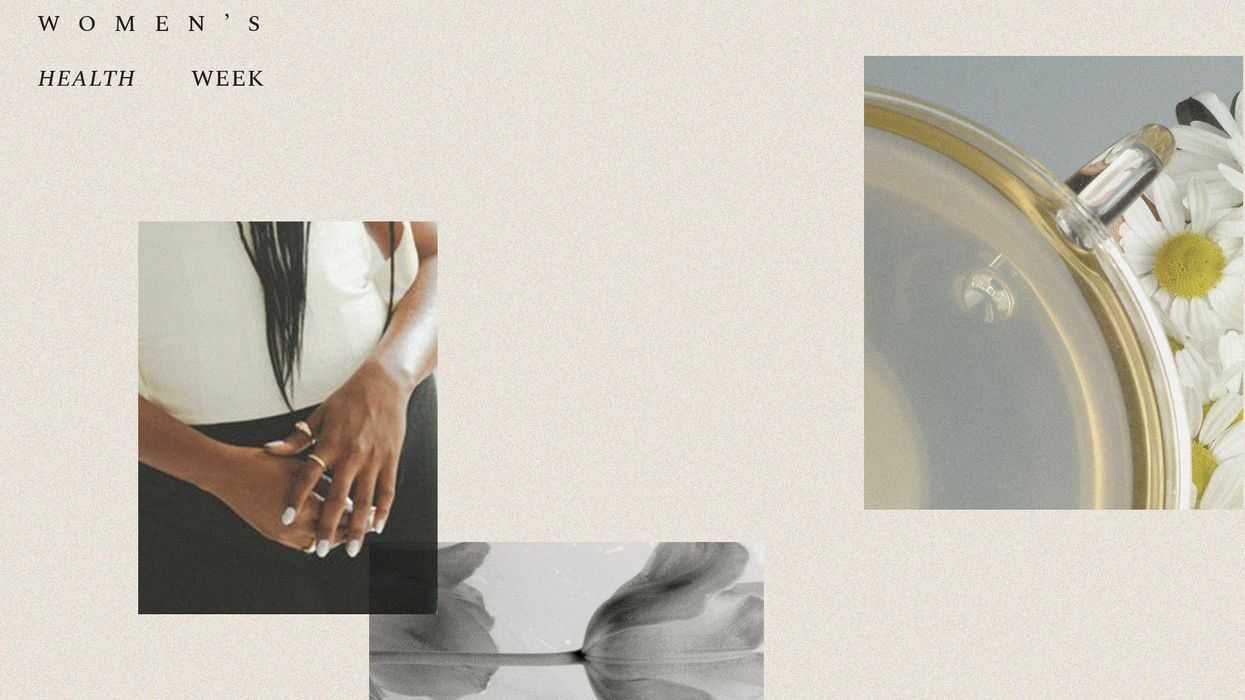A Modern-Day Guide to Balancing Your Hormones
An acupuncturist shares her best tips for hormonal equilibrium, whether you have acne, endometriosis, or anything in between.

If you have endometriosis, PCOS, heavy periods, hormonal acne, or any other hormonal issue, the average OB/GYN will suggest birth control and other Western solutions. You might have also been prescribed spironolactone, or Accutane, or any number of medications. You might not have found much relief.
If you’re in this boat, you’re in good company. It’s a crowded boat—one I prefer to think of more as a yacht than a dinghy, on which likely more than a couple of your friends are riding as well. And though it may get annoying to—continuing the metaphor—ride the waves, it can be a little easier with some alternative medicine.
To get some helpful hints, we chatted with Dr. Stephanie Dixon, DACM, LAc, LMT, a licensed and board-certified acupuncturist and herbalist and a licensed massage therapist. She shared a tea we should all be drinking regularly if we’re looking for hormonal equilibrium, gave a few tips for those of us with endometriosis, and reminded us to do a few things every day in search of balance.
If a woman is experiencing a hormonal imbalance, how often would you suggest someone come in, and for how long?
“For a regularly menstruating person, we usually recommend weekly acupuncture through three cycles to see any changes that may happen month to month,” says Dixon, who just opened the Rooted Refuge in Queens.
Changes often occur within the second month, but at least three months of regular acupuncture is wise. “Often we see progress by the second cycle, but to give the body some positive reinforcement for all the great rebalancing work it does, continuing through the third cycle is best for more long-lasting effects,” Dixon says.
“For a non-menstruating or irregularly menstruating person, we usually recommend weekly acupuncture for six to eight weeks, and then reevaluate symptoms to see if a longer course of acupuncture is needed, or if monthly check-ins are better,” she adds.
But there’s nothing wrong with coming in for acupuncture indefinitely. “Since hormonal imbalance can affect many different systems of the body, most people getting regular acupuncture also notice changes in things they might have previously thought were unrelated, such as digestive or sleep improvements,” Dixon says. “So lots of folks continue on even when the initial course of treatment is finished.”
How about herbs? Any you would suggest in particular?
The thing is—everyone is different, and herbs are definitely not a one-size-fits-all situation. “Recommendations are wholly dependent on the particular hormonal issues and symptoms the person is experiencing,” Dixon says.
“I often hear of people who have been told to take certain herbs or formulas for ‘any hormonal issue,’ but since all bodies are different, what is helpful for one person may be harmful for another,” she adds.
“A good example of this is vitex, which is also known as chaste tree berry, or man jing zi in our formulary,” Dixon says. “I often hear of it as being used for ‘general hormone imbalance,’ but since it boosts progesterone levels—the dominant hormone present during the second half of our cycle—it may cause PMS-like symptoms for folks who already have enough progesterone.” In other words, eek!
When in doubt, it’s best to just go ahead and consult a professional. “Seeing a licensed practitioner for herbal recommendations is best, as it will take a whole-body medicine approach and tailor a plan just for you,” Dixon says.
So—is it the same deal for vitamins and supplements, or are there any you’d suggest in particular?
“I have similar thoughts with vitamins and supplements as I do herbs for hormonal balance, but I will say that a good multivitamin and probiotic can be very helpful for keeping symptoms in check,” Dixon says.
If you have endometriosis, you could also consider one other supplement, Dixon adds. “One other specific research-backed recommendation is for people with endometriosis, a condition of estrogen dominance that often causes very heavy bleeding, bloating, fatigue, and sometimes pelvic or abdominal pain,” she says.
“DIM is a natural supplement that helps the body to process and break down estrogen more effectively and bring hormone levels back into balance, so taking 200 mg of this supplement per day is very helpful for people with endometriosis,” says Dixon.
I’ve always read that spearmint tea is amazing for balancing hormones. Have you found that to be true?
Turns out that spearmint’s healing properties are not a myth. “Spearmint tea does a great job of lowering androgen levels, which can cause breakouts when in excess,” Dixon says.
And the temperature at which you drink it does matter. “In traditional Chinese medicine, we always recommend having all drinks be room temperature or warm to support easier digestion, so one cup of warm spearmint tea per day for three months would be the usual recommendation to rebalance androgen levels,” she adds.
Acne is often a representation of a hormonal issue. Any suggestions around skin issues and hormones?
“Absolutely, we treat acne very often in Chinese medicine,” Dixon says. “So many folks come into our office having tried every product under the sun and are still experiencing cyclical or consistent skin issues.”
If that has been your experience, Chinese medicine might be helpful. “Our approach in Chinese medicine is often to treat from the inside out, meaning using herbal formulas along with acupuncture and lifestyle changes for a period of time to work with the root cause of the acne,” Dixon says.
Some of these suggestions are things you’ve probably heard before. “Staying hydrated and identifying any inflammatory dietary staples is key, so keeping a food journal during the initial stages of treatment can often be really helpful,” she says. “Skin often takes some time to heal completely, but there are topical herbal products your practitioner can recommend to you during the course of treatment to help things move a bit faster.”
Our adrenals are shot these days, which isn’t helpful for hormonal imbalances. Any suggestions around self-care to help balance and calm the hormonal system?
“So true! In NYC we really like to do the most, so I find the ‘less is more’ approach around suggestions for self-care can make it feel more doable rather than having it be another task on the list,” Dixon says.
“Instead of adhering to a very stringent or intense workout or diet plan, I think just making sure to get some form of movement in most days is very helpful,” she says. “Sticking to a regular bedtime and reducing caffeine intake can help adrenal recovery immensely, so I often recommend that folks replace that second cup of coffee with some herbal tea instead.”
If that seems like an insane suggestion, you can still find time for self-care without cutting the caffeine. “Taking some time each day for peaceful reflection and treating oneself to simple joys like warm baths, foot soaks, and laughter meditations is incredibly restorative,” Dixon says. “When we take care of ourselves, we are better able to take care of others, so the benefits are two-fold and beyond.”
What would you say is the most important thing to keep in mind while trying to balance one’s hormones naturally?
Bad news, guys: Dixon reminds us that the levels of stress many of us are experiencing could be counterbalancing the work we’re doing to balance hormones. “Keeping stress in check is the most important thing to keep in mind while trying to balance one’s hormones naturally,” she says.
“Stress reactions in the body are super inflammatory, so incorporating any of the above ‘treat yourself’ suggestions regularly, along with getting good rest at night, staying hydrated, moving around a bit, and eating a well-balanced diet are key to hormonal balance,” Dixon adds.
Other than acupuncture, are there other healing modalities you’d recommend?
“I think massage can be a wonderful tool to reduce stress, which in turn creates better hormonal balance,” Dixon says. “Plus—it just plain feels great!”
[Editor’s Note: As ever, we are not doctors or medical know-it-alls. And everybody is different, so make sure to check with a doctor before trying anything new.]
Want more stories like this?
Considering Freezing Your Eggs? Style Director Danielle Prescod on Preserving Her Reproductive Future
You Wanted to Get Pregnant—Then the Pandemic Hit. Now What?
What It’s Like to Be a New or Expecting Mom Right Now




